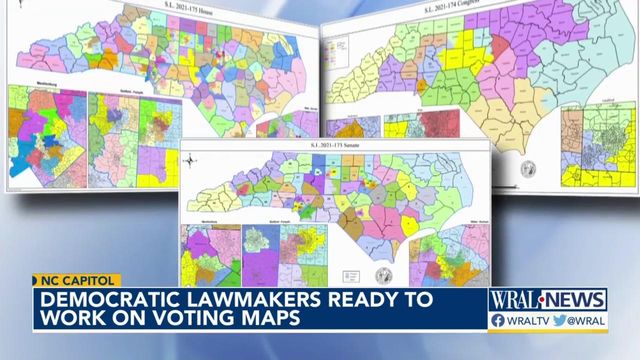Republicans to redraw voting maps following NC Supreme Court order
North Carolina Republican House Speaker Tim Moore says state lawmakers will go forward and redraw voting maps following an order from the state Supreme Court.
Posted — Updated"We will redraw the maps," Republican House Speaker Tim Moore told reporters Monday. "What we're doing right now is really looking at what the court's order was.
"The trial court upheld our maps, but the state Supreme Court struck those down. There really wasn't a lot of metrics or guidance that was provided. What we're trying to look at is to see what kinds of things they would have looked at to have tried to conclude that the maps were partisan in some manner."
Moore, who is one of the six lawmakers listed on the lawsuit voting rights groups brought forward, said voting on new maps will probably take place sometime next week.
Democratic legislators had expected to return to work on Monday after the state's highest court told them to start over on their voting maps. But the GOP leadership didn't appear to be in a hurry, as things were mostly quiet at the legislative building.
Republicans are still waiting on a full opinion from the high court to inform the map-drawing process. A three-judge panel comprised of two Republicans and one Democrat will decide whether the updated maps comply with the state Supreme Court's directions. If the trial court determines the GOP-led redraw doesn't comply with with the high court's order, it could choose to go with an alternative map presented by a plaintiff or an independent redistricting expert.
The court ruled along party lines, with four Democratic justices ordering the redraw and three Republican justices opposing to the effort.
But the court’s order doesn’t clearly specify what a more equitable map would look like.
Democratic leaders told reporters Monday that they were ready to get to work on the new maps ordered by the court.
Senate minority leader Dan Blue said he wants to see the high court's full decision but believes a compliant map would ensure no party is guaranteed an electoral majority.
"Fair maps don't guarantee the Democrats will win, and it wouldn't guarantee that Republicans would win," Blue said. "From the language used in the order, they would say that you can't set up a set of circumstances so that regardless of what the vote for Democrats is—in the mid 50s, or somewhere else—they still can’t win."
Blue said lawmakers can get started on the redraw process now on a redraw by using politically neutral criteria and statistical models.
Democratic Justice Sam Ervin is up for reelection, while his Democratic colleague, Robin Hudson, is not seeking reelection, paving the way for a possible 5-2 conservative court next year.
Republican Lt. Gov. Mark Robinson criticized the high court's decision in a statement on Monday.
"It’s very sad that activist judges, who speak at length about the injustices of the past when the rule of law was ignored over race and politics, make decisions based on those very things today," Robinson said.
Party leaders on both sides acknowledge the Republican-controlled legislature has the ability redraw the U.S. House map ahead of the 2024 election.
It remains to be seen whether state lawmakers could also retool state House and Senate maps after the 2022 election and keep them in place for the remainder of the decade.
Such an action is open to one’s interpretation of the state constitution and could depend on whether the legislative maps Republicans are expected to redraw will receive a trial court’s approval. Also complicating future state boundaries is the possibility of Republicans appealing voting maps to the U.S. Supreme Court.
Asked if he's considering appealing the state Supreme Court's decision to the U.S. Supreme Court, Moore said: "We have not ruled that out at this point. We're pursuing all those options, but given the very tight timeframe, I think it's very important that we move forward and start working on some maps."
House Minority Leader Robert Reives II said gerrymandered districts have led to political gridlock and dysfunction because candidates have to appeal to the most extreme parts of their political base to get elected.
"If you make fair maps, and you bring people closer to situations where they have to listen to each other, we're all better off," Reives said. "And I am proud that the court made a decision here to show that we're better off with fair maps."
Related Topics
• Credits
Copyright 2024 by Capitol Broadcasting Company. All rights reserved. This material may not be published, broadcast, rewritten or redistributed.






